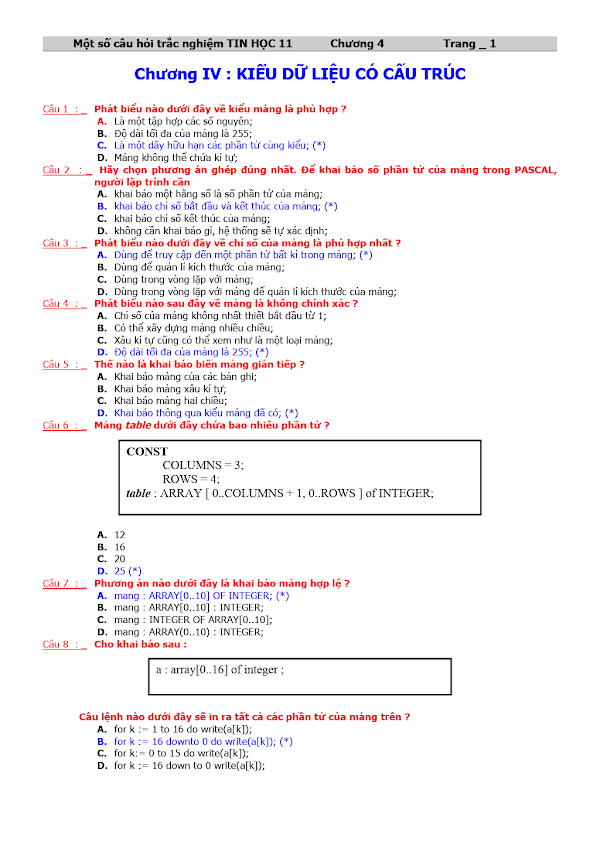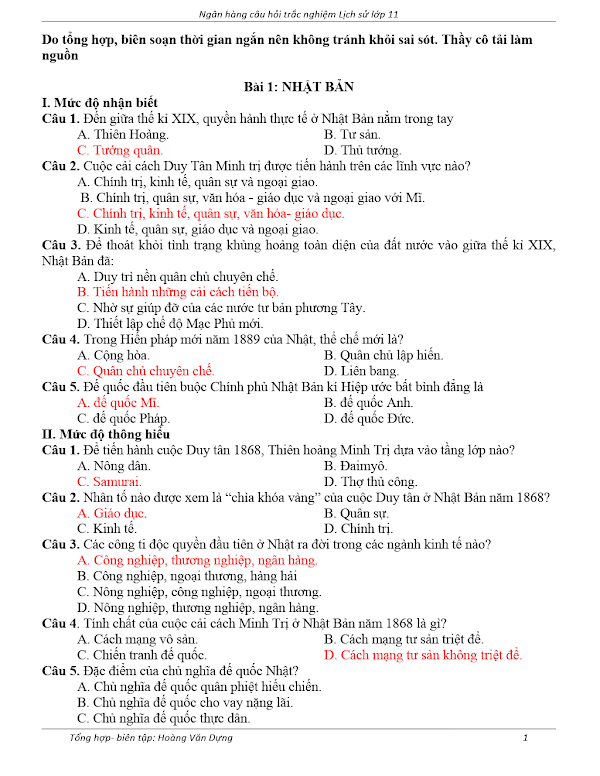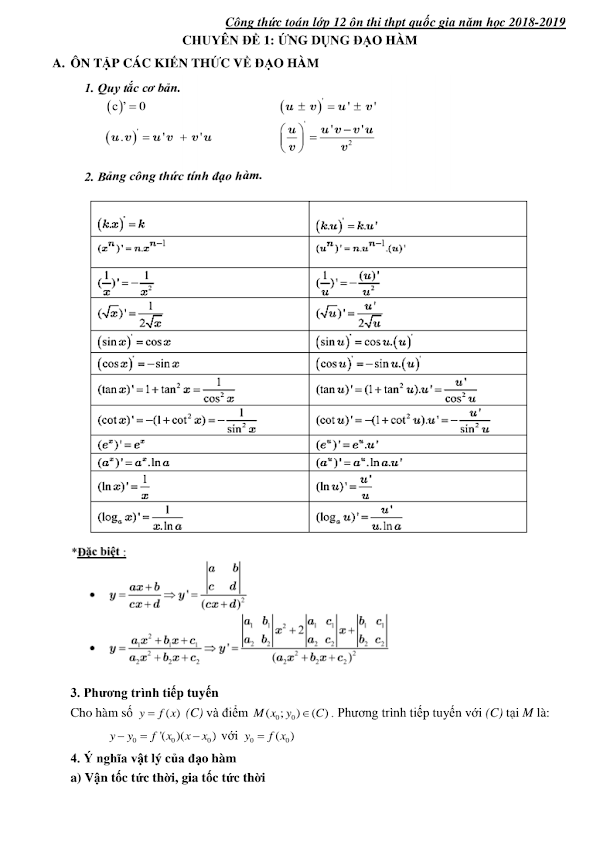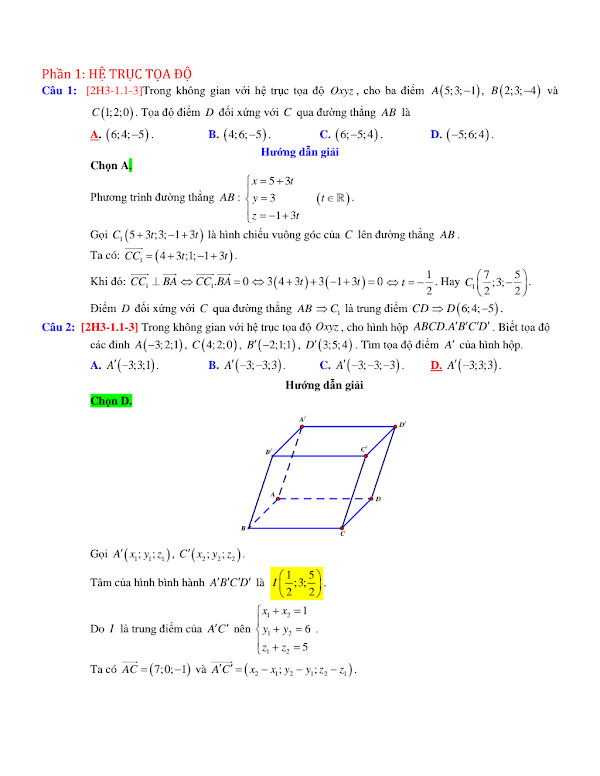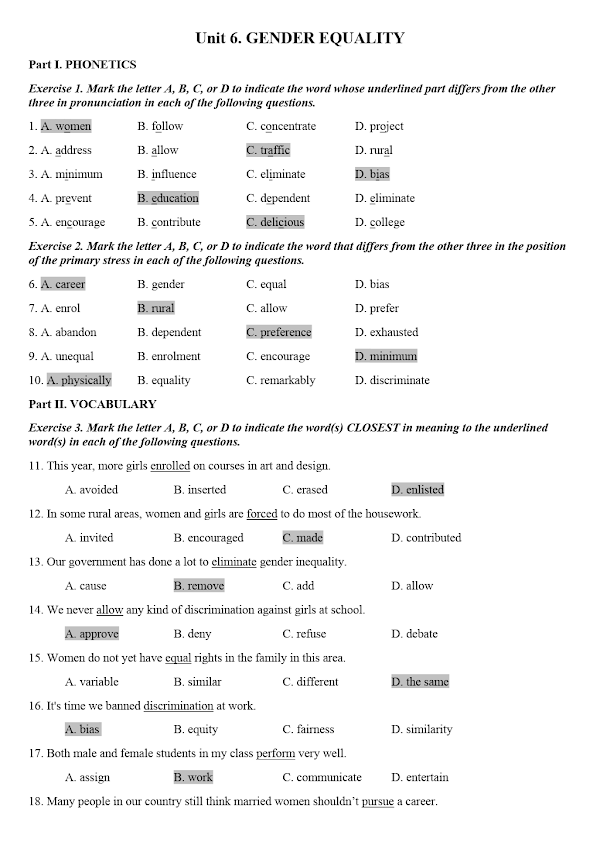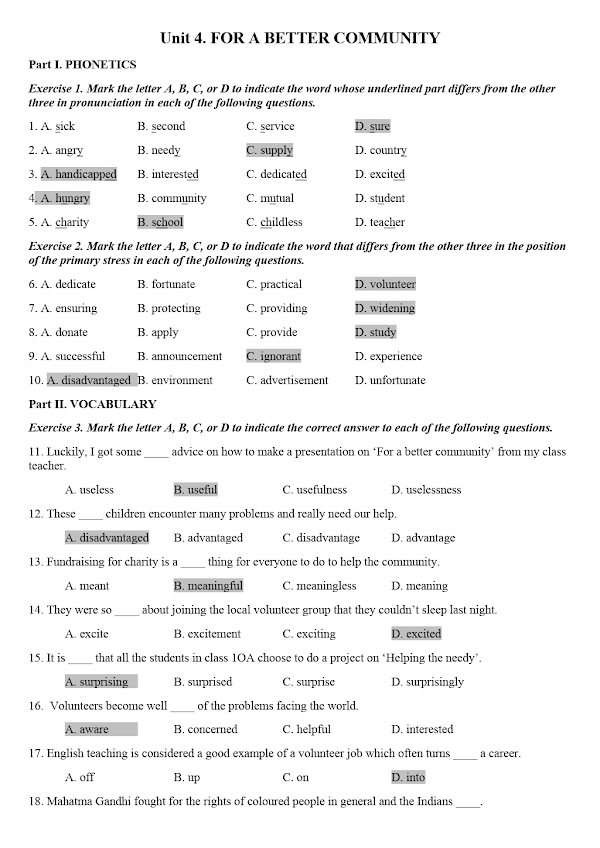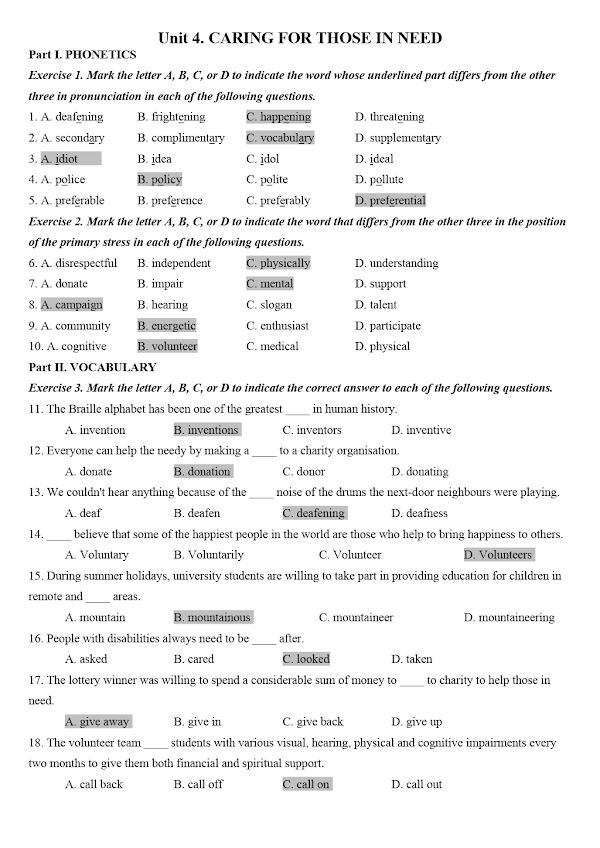Đề luyện tập kiểm tra môn Tiếng Anh lớp 10 - Unit 6: Gender equality
Chào các bạn học sinh và quý thầy cô, hôm nay LogaVN gửi tới bạn đọc tài liệu "Đề luyện tập kiểm tra môn Tiếng Anh lớp 10 - Unit 6: Gender equality". Hi vọng sẽ giúp ích cho các bạn học tập và giảng dạy.
Unit 6. GENDER EQUALITY
Part I. PHONETICS
Exercise 1. Mark the letter A, B, C, or D to indicate the word whose underlined part differs from the other three in pronunciation in each of the following questions.
1. A. women B. follow C. concentrate D. project
2. A. address B. allow C. traffic D. rural
3. A. minimum B. influence C. eliminate D. bias
4. A. prevent B. education C. dependent D. eliminate
5. A. encourage B. contribute C. delicious D. college
Exercise 2. Mark the letter A, B, C, or D to indicate the word that differs from the other three in the position of the primary stress in each of the following questions.
6. A. career B. gender C. equal D. bias
7. A. enrol B. rural C. allow D. prefer
8. A. abandon B. dependent C. preference D. exhausted
9. A. unequal B. enrolment C. encourage D. minimum
10. A. physically B. equality C. remarkably D. discriminate
Part II. VOCABULARY
Exercise 3. Mark the letter A, B, C, or D to indicate the word(s) CLOSEST in meaning to the underlined word(s) in each of the following questions.
11. This year, more girls enrolled on courses in art and design.
A. avoided B. inserted C. erased D. enlisted
12. In some rural areas, women and girls are forced to do most of the housework.
A. invited B. encouraged C. made D. contributed
13. Our government has done a lot to eliminate gender inequality.
A. cause B. remove C. add D. allow
14. We never allow any kind of discrimination against girls at school.
A. approve B. deny C. refuse D. debate
15. Women do not yet have equal rights in the family in this area.
A. variable B. similar C. different D. the same
16. It's time we banned discrimination at work.
A. bias B. equity C. fairness D. similarity
17. Both male and female students in my class perform very well.
A. assign B. work
Unit 6. GENDER EQUALITY
Part I. PHONETICS
Exercise 1. Mark the letter A, B, C, or D to indicate the word whose underlined part differs from the other three in pronunciation in each of the following questions.
1. A. women B. follow C. concentrate D. project
2. A. address B. allow C. traffic D. rural
3. A. minimum B. influence C. eliminate D. bias
4. A. prevent B. education C. dependent D. eliminate
5. A. encourage B. contribute C. delicious D. college
Exercise 2. Mark the letter A, B, C, or D to indicate the word that differs from the other three in the position of the primary stress in each of the following questions.
6. A. career B. gender C. equal D. bias
7. A. enrol B. rural C. allow D. prefer
8. A. abandon B. dependent C. preference D. exhausted
9. A. unequal B. enrolment C. encourage D. minimum
10. A. physically B. equality C. remarkably D. discriminate
Part II. VOCABULARY
Exercise 3. Mark the letter A, B, C, or D to indicate the word(s) CLOSEST in meaning to the underlined word(s) in each of the following questions.
11. This year, more girls enrolled on courses in art and design.
A. avoided B. inserted C. erased D. enlisted
12. In some rural areas, women and girls are forced to do most of the housework.
A. invited B. encouraged C. made D. contributed
13. Our government has done a lot to eliminate gender inequality.
A. cause B. remove C. add D. allow
14. We never allow any kind of discrimination against girls at school.
A. approve B. deny C. refuse D. debate
15. Women do not yet have equal rights in the family in this area.
A. variable B. similar C. different D. the same
16. It's time we banned discrimination at work.
A. bias B. equity C. fairness D. similarity
17. Both male and female students in my class perform very well.
A. assign B. work C. communicate D. entertain
18. Many people in our country still think married women shouldn’t pursue a career.
A. attempt B. attach C. achieve D. want
19. Most employers prefer male workers to female ones.
A. want B. compliment C. care about D. favour
20. She failed to get into medical university.
A. passed B. qualified C. didn’t succeed D. satisfied
21. In order to be successful, we should never give up hope.
A. fight B. abandon C. continue D. suspect
22. Gender discrimination has become a hot subject of conversations among school students.
A. topic B. study C. fact D. case
23. The government took big steps to prevent gender inequality.
A. increase B. avoid C. promote . D. cause
24. Those people who have enough courage and will are likely to be successful.
A. energy B. motivation C. bravery D. desire
25. Nowadays, many women are aware of gender preferences in favour of boys.
A. fail B. ignore C. deny D. acknowledge
26. With great effort, she passed the driving test at the first attempt.
A. succeeded in B. failed C. enrolled D. deferred
27. Female firefighters are sometimes the targets of laughter and anger from the coworkers and local people.
A. reasons B. sources C. directions D. victims
28. Many women had to pay a heavy price to win equality.
A. achieve B. lose C. attempt D. respect
29. Traditional women are often passive and dependent on their husbands.
A. free B. reliant C. adhered D. strong
30. Women will be exhausted if they have to cover both jobs at work and at home.
A. very relaxed B. very pleased C. very tired D. very happy
31. Men should share household chores with women in their families.
A. cover B. finish C. take D. split
32. The Government has raised the national minimum wage.
A. bonus B. expense C. waste D. pay
33. They were qualified for the job, but they were not recruited.
A. competitive B. selected C. competent D. applied
34. Wage discrimination affects women negatively.
A. motivates B. influences C. encourages D. affords
35. How are governments addressing the problem of inequality in wages?
A. focusing on B. raising C. creating D. ignoring
36. Many countries now allow and encourage women to join the army and the police forces.
A. permit B. force C. make D. prevent
37. We should encourage women to join more social activities.
A. prevent B. stimulate C. permit D. forbid
38. Working mothers contribute to household income.
A. reduce B. take C. add D. double
39. Family values are likely to pass down from generation to generation.
A. put down B. cut down C. go down D. hand down
40. Women's salaries are becoming important to their household budgets.
A. funds B. costs C. expenses D. fees
41. Experiences at work help women to widen their knowledge.
A. eliminate B. broaden C. restrict D. spoil
42. If women have to do too much housework, they cannot concentrate or work effectively.
A. learn B. distract C. focus D. ignore
Exercise 4. Mark the letter A, B, C, or D to indicate the word(s) OPPOSITE in meaning to the underlined word(s) in each of the following questions.
43. The gender gap in primary education has been eliminated.
A. variety B. inconsistency C. difference D. similarity
44. The United Kingdom has made a remarkable progress in gender equality.
A. insignificant B. impressive C. notable D. famous
45. Men and women equally gain first class degrees.
A. acquire B. lose C. achieve D. Obtain
46. The United Kingdom still faces challenges in gender equality.
A. fairness B. inequality C. evenness D. equilibrium
47. Much has to be done to achieve gender equality in employment opportunities.
A. attain B. obtain C. reach D. abandon
48. People have eliminated poverty and hunger in many parts of the world.
A. created B. eradicated C. phased out D. wiped out
49. Both genders should be provided with equal rights to education, employment and healthcare.
A. deprived of B. furnished with C. equipped with D. supplied with
50. We should not allow any kind of discrimination against women and girls.
A. inequality B. hatred C. unbiased feeling D. intolerance
Part III. GRAMMAR
Exercise 5. Mark the letter A, B, C, or D to indicate the underlined part that needs correction in each of the following questions.
51. A lot of people think that marriage women shouldn’t pursue a career.
A B C D
52. We must stop discrimination on people coming from the rural area.
A B C D
53. My brother is good with cooking and he can cook very delicious food.
A B C D
54. I guess they may be kept home doing housework and look after their children.
A B C D
55. Women in rural areas might be forced to work both at home but on the fields.
A B C D
56. Some people think that girls shouldn’t be allowed to going to university.
A B C D
57. Gender discrimination should be eliminated for create equal opportunities in education for everyone.
A B C D
58. More girls should being chosen to represent us in the School Youth Union.
A B C D
59. Both women and men should be given equal rights for education and employment.
A B C D
60. This discrimination against women and girls must be abolishing.
A B C D
61. Efforts should be make to offer all children equal access to education.
A B C D
62. It is clear that gender differences cannot prevent a person to pursue a job.
A B C D
63. Traditional women were mainly responsible to doing housework and looking after their husbands and
A B C D
children.
64. Doing housework every day is really boring and tired.
A B C D
65. In the past, women was often passive and dependent on their husbands.
A B C D
66. Women usually get less pay as men for doing the same job.
A B C D
Exercise 6. Mark the letter A, B, C, or D to indicate the correct answer to each of the following questions.
67. It is important that men should share household tasks ____ their wives.
A. to B. with C. for D. against
68. Women are more hard-working than men although they are physically ____ weaker.
A. more B. as C. so D. Ø
69. Women are likely to become trouble-makers ____ they are too talkative.
A. in order B. so C. because D. thus
70. Some people tend to wrongly believe that men are not as good ____ children as women.
A. with B. as C. at D. on
71. Not many people are aware ____ male preference in this company.
A. for B. on C. about D of
72. I don't think mothers should be discouraged ____ outside the home.
A. to work B. from working C. to working D. Working
73. More and more girls apply ____ males’ jobs these days.
A. by B.for C. about D. to
74. Working mothers can inspire their kids ____ their hard work and devotion.
A. with B. about C. at D. for
75. Now I wish I could ____ a medical career to become a doctor.
A. pursuing B. be pursuing C. be pursued D. pursue
76. Educated women are becoming less dependent ____ their husbands’ decisions.
A. about B.of C.on D. for
77. This policewoman is famous ____ her courage and strong will.
A. with B. for C. on D. about
78. I am thinking ____ becoming a childcare worker because I love children.
A. of B. with C. for D. on
79. A lot of things need to be done ____ gender equality in education, employment and healthcare.
A. promoting B. in promoting C. for promoting D. to promote
80. Nowadays, a number of parents still have preference for boys ____ girls.
A. rather B. than C. over D. instead
81. Women’s salaries are getting more important ____ their household income.
A. at B. to C. in D. within
82. I think everybody should be provided ____ equal access to health services.
A. with B. on C. for D. to
83. Gender discrimination must ____ in order to create a better society.
A. eliminate B. be eliminating C. be eliminated D. eliminated
84. This company can ____ for wage discrimination among workers of different genders.
A. be sued B. be suing C. sue D. sued
85. Poor women in disadvantaged areas should ____ more help by governments.
A. offer B. be offered C. be offering D. offered
86. Married women should be encouraged ____ a career of their preference.
A. pursued B. pursue C. to pursue D. from pursuing
87. Domestic violence ____ women and girls must be wiped out at any cost.
A. on B.at C.for D. against
88. Having good education enables women ____ equality.
A. to achieve B. achieve C. to achieving D. Achteved
89. We all need to cooperate to fight ____ racism and gender discrimination.
A. for B. against C. in D. about
90. The women in this company have been demanding equal pay____ equal work.
A. against B. on C. for D. with
Part IV. SPEAKING
Exercise 7. Mark the letter A, B, C, or D to indicate the correct response to each of the following exchanges.
Two friends Nam and Lan are talking about the topic of gender equality.
91. Nam: “Do you think that there are any jobs which only men or only women can or should do?”
Lan: “____”
A. Men are better at certain jobs than women.
B. I agree. This really depends on their physical strengths and preferences.
C. Women and men should cooperate with each other.
D. Men are often favoured in certain jobs.
92. Lan: “Would you rather work for a male or female boss?”
Nam: “____”
A. I’ve been self-employed for five years. B. I don’t like working under time pressure.
C. I prefer a male boss. D. I can’t stand the women gossips.
93. Nam: “Would you rather have a male or a female secretary?”
Lan: “____”
A. I want to have a female one.
B. The number of female secretaries is increasing.
C. The number of female secretaries is staying the same.
D. Female secretaries outnumber male ones.
94. Lan: “How do the roles of men and women differ in your family?”
Nam: “____”
A. Most of men don’t want to stay at home.
B. Women are changing their roles.
C. Most men are very bossy and arrogant.
D. Men are breadwinners and women are caregivers.
95. Nam: “Which gender, do you think, works harder: male or female?
Lan: “____”
A. I think it depends on individuals rather than gender.
B. Males like high position jobs more than females.
C. Females prefer to have a stable job.
D. Both males and females are responsible for childcare.
96. Nam: “Which gender spends most of the time shopping?”
Lan: “____”
A. Shopping has always been my hobby.
B. More and more people are shopping online these days.
C. Both genders like shopping.
D. It depends on who keeps the money.
97. Nam: “Which gender is most likely to ask strangers for directions?”
Lan: “____”
A. Men sometimes ask strangers for directions as well.
B. Women are because their sense of space and directions is worse.
C. Both men and women can use GPS these days.
D. GPS is very useful to help car drivers.
98. Nam: “Why are there generally so few women in top positions?”
Lan: “____”
A. Top positions are the highest in career ladder. B. Top positions are hard to climb to.
C. I guess men tend to make better leaders. D. Women also want to climb to top positions.
99. Nam: “Which gender tends to live longer?”
Lan: “____”
A. Women tend to live 5 years longer than men. B. Women like a peaceful and quiet life.
C. Men want to live an active life. D. Both men and women tend to live longer.
100. Nam: “As women live longer than men, should they retire later?”
Lan: “____”
A. When women are retired, they want to enjoy life.
B. When men are retired, they still want to continue working.
C. The government is still discussing the retirement age.
D. I don't think so. Physically, they are weaker and they need to retire earlie
101. Lan: “What behaviours are only seen as appropriate for women?
Nam: “____”
A. Women are getting more and more independent.
B. In some places, women still suffer gender discrimination.
C. I don’t really know. Maybe gossiping and crying in public places.
D. Gender discrimination should be abolished.
102. Lan: “What behaviours are only seen as appropriate for men?”
Nam: “____”
A. What are men’s appropriate behaviours?
B. There are many, such as offering to pay for meals or drinks.
C. Men, in general, don’t have appropriate behaviours.
D. Men don’t want other people to criticize them.
103. Lan: “What clothing is appropriate for women but not for men?”
Nam: “____”
A. They are long dresses and skirts. B. Men are also changing their fashion styles.
C. Many clothes now are uni-sex. D. Men should never wear women’s clothes.
104. Nam: “Which gender is better at team sports?”
Lan: “____”
A. Women are better at individual sports. B. Both men and women can do sports.
C. Physically, men are stronger than women. D. Certainly, men are better.
105. Lan: “Which gender do you think studies most?”
Nam: “____”
A. Studying is quite long lasting.
B. This depends more on individuals rather than genders.
C. Gender discrimination in education is a hot debate.
D. Female students should also be allowed to further their studies.
Part V. READING
Exercise 8. Read the following passage and mark the letter A, B, C, or D to indicate the correct word or phrase that best fits each of the numbered bla
THE SUFFRAGETTES
England has had a democracy for a long time. Until 1918, however, women were not allowed (106) ____ in it. The right to vote is called ‘suffrage’ and the English women who fought (107) ____ and won that right were called “suffragettes”.
The suffragette movement was led by Emmiline Pankhurst. In 1903, she (108) ____ an organization called the Women’s Social and Politica Union (WSPU). Members of the WSPU went to the Prime Minister to (109) ____ suffrage, but he told them to “be patient”. The suffragettes were not (110) ____.They wanted change immediately.
The fight for the vote for women became (111) ____ and sometimes violent. In 1908, two suffragettes (112) ____ themselves to the fence outside the Prime Minister's front door! They were arrested and spent weeks in jail. In 1912, hundreds of women (113) ____ the streets of London. They broke shop windows and even threw Stones (114) ____ the Prime Minister’s house. Thousands of suffragettes were (115) ____ for this and similar actions over the years.
World War I (1914-1918) proved to be an important (116) ____ for the women’s movement. Women contributed so much to the war effort as nurses', factory workers, and at other jobs that more people became convinced of their right to vote. Women were (117) ____ given that right in January, 1918.
106. A. to voteB. for voteC. in votingD. vote107. A. withB. forC. againstD. to108. A. didB. madeC. foundedD. found109. A. demandB. askC. wantD. raise110. A. satisfactionB. satisfactoryC. satisfyD. satisfied111. A. intensiveB. intenseC. intendD. intention112. A. trainedB.changedC. chainedD. charged113. A. took toB. took inC. took upD. took over114. A. ontoB. onC. overD. at115. A. jailB. jailedC. jailingD. on jail116. A. eventualB. evenC. eventD. eventually117. A. finallyB. finalC. initialD. initiallyExercise 9. Read the following passage and mark the letter A, B, C, or D to indicate the correct answer to each of the questions.
For Catherine Lumby, deciding to take on the role of breadwinner in her relationship was not a difficult choice. When she discovered she was pregnant with her first child, she had just been offered a demanding new role as Director of the Media and Communications department at the University of Sydney. But she didn't see this as an obstacle, and was prepared to use childcare when the children were old enough. It came, therefore, as a surprise to Lumby and her husband Derek that, after the birth of their son, they couldn’t actually bear the thought of putting him into childcare tor nine hours a day. As she was the one with the secure job, the role of primary care-giver fell to Derek, who was writing scripts for television. This arrangement continued for the next four years, w ith Derek working from home and caring for both of their sons. He returned to full-time work earlier this year.
Whilst Lumby and her husband are by no means the only Australians making such a role reversal, research suggests that they are in the minority. In a government-funded survey in 2001, only 5.5 percent of couples in the 30-54 year age group saw the women working either part- or full-time while the men were unemployed.
The situation is likely to change, according to the CEO of Relationships Australia, Anne Hollonds. She suggests that this is due to several reasons, including the number of highly educated women in the workforce and changing social patterns and expectations. However, she warns that for couples involved in role-switching, there are many potential difficulties to be overcome. For men whose self-esteem is connected to their jobs and the income it provides to the family, a major change of thinking is required. It also requires women to reassess, particularly with regard to domestic or child-rearing decisions, and they may have to learn to deal with the guilt of not always being there at key times for their children. Being aware of these issues can make operating in non-traditional roles a lot easier.
118. What is the main idea of the passage?
A. Men being the bread winners B. Traditional roles of women
C. Women being the home makers D. Reversed roles between men and women
119. Catherine and her husband decided that Catherine would be the primary earner because ____.
A. she had a badly paid job B. she was not good at childcare
C. she had a reliable job D. she wanted her husband to stay at home
120. In paragraph 1, the word “him" refers to ____.
A. their son B. her husband C. Derek D. her colleague
121. They decided that Derek would look after their son because they ____.
A. couldn’t afford to put their child in care for long periods each day
B. didn’t want to put their child in care for long periods each day
C. thought childcare was not safe enough for their children
D. worried about their son’s health problems
122. In paragraph 2, the word “reversal" is closest in meaning to ____.
A. stability B. modification C. rehearsal D. switch
123. One reason tor a chang

